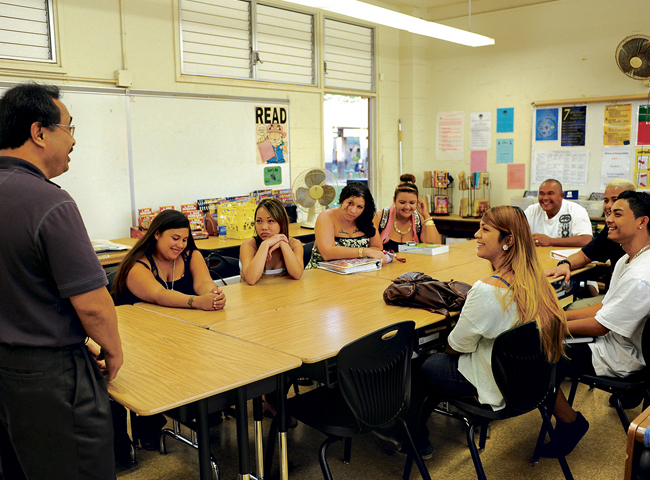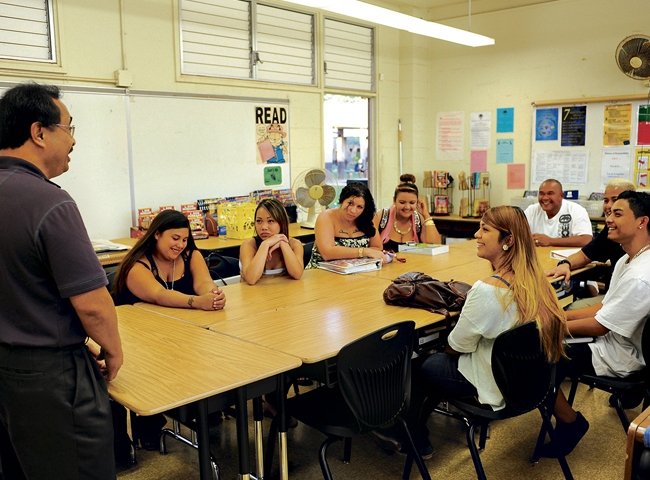Schools For Adults Saved By The Bell
It’s one thing when our national and local leaders speak about the value education can have in stimulating resurging economies, whether in the Islands or on the Mainland. It’s a step above when those same leaders take action to ensure funding for educational programs remains, as much as possible, intact for the public.
It was just in August that Waipahu Community School For Adults principal John Vannatta was able to exhale a breath of relief when Community Schools for Adults, which was on the brink of closing statewide, was granted nearly $5 million in matching funds from the federal AEFLA (Adult Education and Family Literacy Act) and through state legislative appropriations. These funds ensure Community Schools For Adults, although majorly consolidated, will remain open, serving Oahu, Maui, Kauai and Hawaii.
mw-nm-092612-01
There should be some clarification on the type of courses offered at Community Schools for Adults. Sure, the state’s adult schools offer a handful of special-interest classes, such as hula and Japanese language, but the pulse of the adult school system is in its General Education Diploma (GED) and Competency-Based High School Diploma Program (CBHSDP).
“These programs offer a huge amount of value to the community,” says Vannatta. “We offer people an opportunity to complete their secondary education so they can move on. My take on it is we would have a lot more people unemployed – and probably more crime – if not for these courses. We have students who have gone on to a variety of occupations and professions. We are kind of like a well-kept secret.”
Vannatta says a wide demographic range of students enroll each year, but the bulk are age 16 to 24 – usually those who did not complete high school for whatever reason and now understand the value a high school competency degree has for the fate of their futures, both personal and professional.
“For a lot of younger students, they didn’t make the right call when they were 15 or 16, and that’s why they are back at 18 or 19,” says Vannatta. “They realize they have to do something, and these courses give them an opportunity.”
Community Schools for Adults also offers its testing and teaching services to several military branches. Serving Schofield Army Barracks, Marine Corps Base Hawaii, Tripler and Fort Shafter, Community Schools for Adults offers general testing for enlisted servicemen seeking internal promotions and rank advancements. It also provides courses and testing for correctional facility inmates and community programs, such as Adult Friends for Youth, Honolulu Community Action Program and National Guard Youth Challenge.
Serving thousands of enrolled students each year, the 2012-13 school year will pose a bit of a challenge for the registrar, as Community Schools for Adults has been consolidated from 11 main schools to just two, Waipahu and McKinley high schools. Waipahu Community School for Adults now services the entire Leeward, Central and Windward districts of Oahu, from Waianae and Kapolei to Kahuku, as well as the island of Hawaii. McKinley Community School for Adults will service the Honolulu, Moanalua and Farrington districts, as well as Kauai and Maui.
Class registration and transcript requests have to be done through Waipahu and McKinley, but Community Schools for Adults offers a variety of teaching sites, where courses and testing will be conducted in your area or nearby.
Although Community Schools for Adults was granted funding, there are supplemental fees to students. With GED and CBHS-DP courses ranging from 30 to 60 class hours, the enrollment fees will go to maintaining the program as well as instructor salaries, which are almost entirely part-time positions.
When all is said and done, it will now cost students interested in obtaining either their GED or CBHSPD roughly $200, which includes course fees and textbooks.
With new fee requirements, Vannatta is curious about what may happen to enrollment over the next year. But he and the rest of the Community Schools for Adults staff can be proud of the inestimable value their services provide for those seeking degree advancement.
“There are times when you wonder if your students are going to do well. It makes it all worthwhile in the end when you see the smiles on their faces at graduation,” says registrar director Nathan Pinnow.
For registrar or general information, CLICK HERE.







